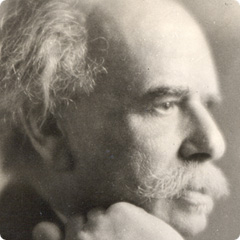 |
 |
 |
 |
 |
 |
"If we were to select the most intelligent, imaginative, energetic, and emotionally stable third of mankind, all races would be present."
Franz Boas (1858–1942)
Anthropologist
Faculty 1896–1936
Boas is the early-twentieth-century scholar most responsible for discrediting the then-dominant scientific theories of racial superiority. Through his elaboration of cultural relativism as an alternative theoretical framework, he came to have an enormous influence on the development of American anthropology. He reexamined the premises of physical anthropology and became an early critic of race rather than environment as an explanation for difference in the natural and social sciences. Perhaps his most influential book, The Mind of Primitive Man (1911), demonstrated that there was no such thing as a "pure" race or a superior one. Not surprisingly, his books were banned in Hitler's Germany. A student of Native American languages, Boas emphasized the importance of linguistic analysis from internal linguistic structure. Long outspoken against totalitarianism in its many guises, he was a fierce advocate of intellectual freedom, supported many democratic causes, and was the founder of the American Committee for Democracy and Intellectual Freedom. In 1963, the scholar Thomas Gossett wrote, "It is possible that Boas did more to combat race prejudice than any other person in history."
|
 |
 |
 |
 |
Boas was born in Minden, Westphalia, and educated at the University of Kiel in Germany. In 1889, he secured his first American job at Clark University in Worcester, Massachusetts. From there, he went to the Field Museum in Chicago, moving to New York in 1895 to work at the American Museum of Natural History. Boas began to lecture at Columbia in 1896, and in 1899 became its first professor of anthropology, a position he held for 37 years. His opposition to American entry into World War I put his tenure in momentary jeopardy. During the 1920s, he felt underappreciated by University president Nicholas Murray Butler and his key administrators, and spent much of his time on campus at Barnard. A reconciliation was effected in 1929, when Boas was honored at the University's 175th-anniversary ceremonies. While at Columbia, he taught and inspired a generation of anthropologists, notably Alfred Kroeber, Ruth Benedict, Margaret Mead, and Zora Neale Hurston. Columbia awarded Boas an honorary degree in 1929.
Read more about Boas in the Columbia Encyclopedia.
|
 |
|
 |
 |
|
 |
 |
 Casey Nelson Blake, professor of history and director of the American Studies program at Columbia University, discusses the arguments of Franz Boas, who became a champion of diversity.
Casey Nelson Blake, professor of history and director of the American Studies program at Columbia University, discusses the arguments of Franz Boas, who became a champion of diversity.


 A prolific author, anthropologist, mentor, and the most influential female social scientist of her era.
A prolific author, anthropologist, mentor, and the most influential female social scientist of her era.

 A pioneering female scholar, Benedict overcame deafness and gender bias to become America's leading anthropologist.
A pioneering female scholar, Benedict overcame deafness and gender bias to become America's leading anthropologist.

 Anthropologist, novelist, folklorist and key figure in the Harlem Renaissance.
Anthropologist, novelist, folklorist and key figure in the Harlem Renaissance. 

 Four who had an impact.
Four who had an impact.

 
Columbia's history, as seen by those who have studied, taught, and worked here.


View a timeline of Columbia's evolution from a small Lower Manhattan campus into the quintessential urban university.
|
 |
|
